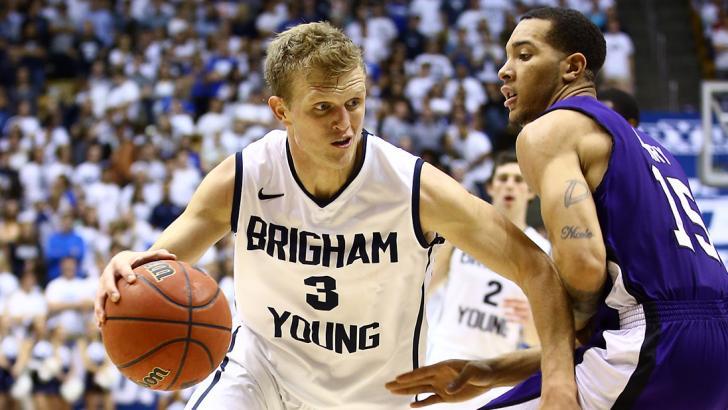- How The Grinch Stole the Rivalry
- 9-Line Prediction: BYU v. UMass
- 9-Line Prediction: BYU v. UNLV
- 9-Line Prediction: BYU v. Fresno St.
- 9-Line Prediction: BYU v. SJSU
- 9-Line Prediction: BYU v. ECU
- 9-Line Prediction: BYU v. Mississippi State
- 9-Line Prediction: BYU v. Boise State
- 9-Line Prediction: BYU at Utah State
- 9-Line Prediction: BYU v. Wisconsin
- How BYU’s offense & defense have stacked up since 2005
- 9-Line Prediction: BYU v. Utah
- 9-Line Prediction: BYU v. LSU
- 9-Line Prediction: BYU v. Portland State
- By the Numbers: 2017 Season Preview
Hoops Résumé Check: January 6
- Updated: January 6, 2014

Things have declined sharply since our last check. Time for the first résumé check of 2014.
A lot of what follows can summed up in what you already know: BYU basketball began West Coast Conference play by losing to two teams with an RPI worse than 100, and that did near-fatal (or totally fatal?) damage to BYU’s NCAA Tournament résumé.
Sure, it felt good to see BYU work out the disappointment of those losses by destroying San Diego at home, and revenge opportunities against Loyola Marymount and Pepperdine arrive this week, but there are no two ways about those losses. They were bad.
So the “résumé check” now becomes an exercise in information, as BYU’s at-large hopes for the NCAA Tournament are nearly non-existent, if not already entirely erased.
Here are your boilerplate explanations for what follows:
RPI (ratings percentage index) is the most well-known and prominent rating in college basketball. It may not always be the best rating, but it seems to be the most prominent one involved in the tournament selection process. So it’s important.
But to give us some more depth, we’ll look at ratings from the savant Ken Pomeroy and from Jeff Sagarin, long-time ratings calculator (and whose football ratings have been part of the BCS formula since the beginning). For a big picture number, I’ve averaged the three ratings in some places — but for the time being, RPI still remains the most important for tournament selection.
The committee also likes to see how teams play away from home, so the combined road/neutral record is also something to watch.
Three games into conference play, here’s BYU’s profile:
Record: 9-7
Home: 6-1
Road 1-5 | Neutral 2-1 | Combined 3-6
RATINGS
RPI: 38 (-16)
KenPom: 55 (-6)
Sagarin: 46 (-19)
STRENGTH OF SCHEDULE
RPI: 3
KenPom: 21
Sagarin: 13
By ratings alone, BYU still looks like it is in contention for an at-large bid — but that’s because an extremely-strong strength of schedule is skewing the Cougars’ overall rating. A 3-6 road/neutral record is bad, and so is a look at BYU’s opponents, individually and in an overall tournament-resume profile:
|
OPPONENT |
RPI |
KenPom |
Sagarin |
AVG |
+/- |
|
|
Weber State |
W |
252 |
154 |
182 |
196 |
+7 |
|
@ Stanford |
W |
88 |
57 |
62 |
69 |
-14 |
|
Mt St Mary’s |
W |
241 |
229 |
250 |
240 |
+20 |
|
Iowa State |
L |
6 |
14 |
4 |
8 |
+3 |
|
Texas (n) |
W |
44 |
65 |
58 |
56 |
-6 |
|
Wichita St (n) |
L |
15 |
15 |
15 |
15 |
-3 |
|
Utah State (n) |
W |
75 |
76 |
78 |
76 |
-10 |
|
North Texas |
W |
188 |
201 |
207 |
199 |
+28 |
|
@ UMass |
L |
3 |
28 |
24 |
18 |
-6 |
|
Prairie View A&M |
W |
248 |
330 |
335 |
304 |
+2 |
|
@ Utah |
L |
167 |
68 |
65 |
100 |
-18 |
|
@ Oregon |
L |
8 |
24 |
21 |
18 |
|
|
OPPONENT |
RPI |
KenPom |
Sagarin |
AVG |
+/- |
|
|
Loyola Marymount |
0-1 |
118 |
134 |
142 |
131 |
|
|
Pepperdine |
0-1 |
140 |
147 |
145 |
144 |
|
|
San Diego |
1-0 |
199 |
159 |
159 |
172 |
(Colorado Mesa, non-DI, excluded)
vs. Top-50
RPI: 1-4
KP: 0-4
Sag: 0-4
AVG: 0-4
vs. Top-100
RPI: 3-4
KP: 3-5
Sag: 3-5
AVG: 3-5
vs. < 100
RPI: 5-3
KP: 5-2
Sag: 5-2
AVG: 5-2
BYU’s record against the top 50 — a key resume point to the selection committee — doesn’t look good. The Cougars’ last shot at a non-conference top-50 statement win was squandered in Eugene in an overtime, will-breaking loss to Oregon.
Such a record against the top-50 wouldn’t necessarily exclude BYU from the NCAA Tournament, but what Dave Rose’s squad has done since against top-100 and sub-100 teams seemingly has. In the RPI, BYU has now lost to three sub-100 teams.
Any improvement teams like Stanford and Texas do for BYU’s résumé will mean little now. Grabbing upset wins on the road at Saint Mary’s and Gonzaga would be awesome, and may breathe new life into what would still be very slim at-large hopes — but ultimately, it looks like it comes down to the WCC Tournament. Any big wins until then will only factor into a better NCAA Tournament seed if the Cougars can win in Las Vegas.



